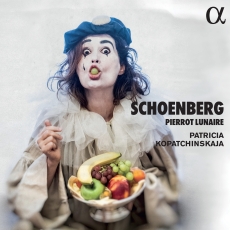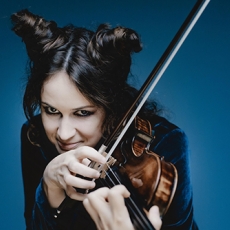Patricia Kopatchinskaja - Schoenberg: Pierrot lunaire - Gramophone
‘A journey, starting with drinking wine with your eyes and eventually deriving sexual pleasure from hanging yourself in the night’ is how Patricia Kopatchinskaja described Pierrot lunaire in an interview with Andrew Mellor in last month’s Gramophone. Always one to do things differently, Kopatchinskaja has been narrating Schoenberg’s Expressionist cabaret since 2015, when tendinitis briefly curtailed her playing, though her identification with the work and its transgressive, moonstruck protagonist seemingly evolved during earlier performances as a violinist in the accompanying ensemble. Given its centrality both to her repertory and to her imagination, her decision to record it, with a hand-picked group of instrumentalists from Camerata Bern, was perhaps inevitable.
Kopatchinskaja trained neither as an actress nor as a singer and claims she has no voice. This is patently untrue, as her range, both vocal and dramatic, makes abundantly clear. There are unnerving squeaks and screams at the top, growls and erotic whispers down below. The besotted duenna of ‘Parodie’ is reimagined as a cackling crone, while ‘Enthauptung’, at the work’s climax, escalates alarmingly from declamation into a terrifying yell. Unlike some interpreters, she wisely avoids the temptation to veer towards song in lyrical moments, which is hugely in the recording’s favour.
Her way with the text, meanwhile, is often chillingly literal, sometimes breaking away from the instructions in the score. At ‘schauerlich und süss’ near the start, we hear both the shudder and the sweetness in her tone, and in ‘Gebet an Pierrot’ the narrator’s repressed laughter resurfaces manically at the end, where Schoenberg doesn’t call for it, effectively fracturing the line. Her voice becomes white and icy as the moon sickens, then darkens in bitter self-assertion at the blasphemy of ‘Rote Messe’. Performing without a conductor – itself a considerable achievement – the ensemble are with her every step of the way, playing with comparably detailed vividness. The moon’s pallor is reflected in the bleached-out flute tone, while candlelight flickers balefully in the piano figurations that accompany that sacrilegious Mass.
It’s a compelling performance and one that commands tremendous respect. Yet there are, I think, occasional drawbacks. Interpretatively everything is extreme, sometimes, perhaps, too much so. Pierrot lunaire enacts a descent from instability to hell then back towards nostalgic memories of an already decayed world, but the intensity of the opening here leaves the performers fractionally too little room for emotional manoeuvre when things get really dark later on. Barbara Sukowa, live on DVD from Salzburg with an ensemble led by Mitsuko Uchida (Belvedere, 9/15), conveys the psychological trajectory more exactingly. Christine Schäfer, Pierre Boulez and the Ensemble Intercontemporain (DG, 10/98) are altogether cooler, but also find profound sadness amid the madness of it all.
The remaining works are all superbly done. Kopatchinskaja takes up her violin again to join pianist Joonas Ahonen for Schoenberg’s Phantasy and Webern’s Four Pieces for violin and piano, the former austere yet exciting, the latter thoughtful and remarkably beautiful. Schoenberg’s arrangement of the Emperor Waltz and Kreisler’s Little Viennese March, affording emotional relief, are played with great elegance and wit. Ahonen brings the programme to its close on his own, meanwhile, with Schoenberg’s aphoristic Six Pieces, carefully exposing the deep emotional resonances that offset their brevity. Kopatchinskaja’s Pierrot may, I suspect, divide opinion, but this is nevertheless an engrossing, challenging disc that repays repeated hearings.

